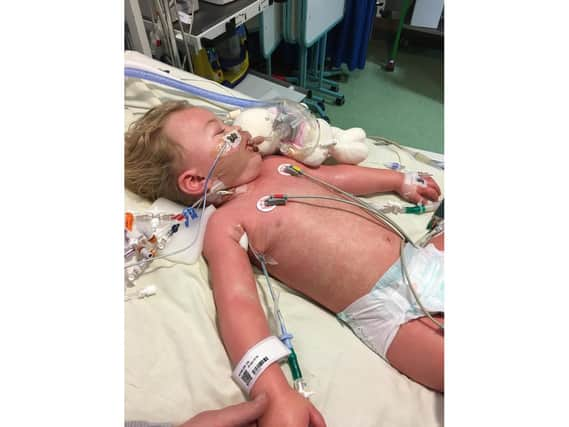Portsmouth parents relive their anguish after daughter contracted sepsis and say: '˜It must not happen to anyone else'


Lilly Reynolds was 19 months old when sepsis - a blood infection '“ took hold and left her fighting for life. At one point it was feared she could lose her left foot, and although she has since recovered, the long-term effects are not yet known.
Lilly's mother Danielle Barter said: '˜The whole experience was extremely frightening and we wouldn't want any parents to be put through a similar experience. Fortunately, Lilly has made a good recovery from the pneumonia and sepsis, although she is still suffering from her ordeal and the prognosis for her foot and leg is still unknown.'
Advertisement
Hide AdAdvertisement
Hide AdThe toddler developed a fever and and was breathing erratically. Danielle and Lilly's dad Luke called 111 for advice and were told to go to an out-of-hours GP surgery. The doctor diagnosed a respiratory infection and said that if she got worse they should seek further medical advice.


She recovered slightly the next day, but the day she had deteriorated and had a rash behind her ears, on her torso and on her head, had become red on her face, was extremely lethargic, would not take fluids and her nappies were almost dry. Her parents took her to St Mary's Hospital Walk-in Centre in Milton, where they were told she had tonsillitis and would need antibiotics. However, the doctor was worried enough to ask Queen Alexandra Hospital for advice and Lilly was taken there for a check.
The QA consultant recommended not taking the antibiotics that St Mary's had prescribed as, in his opinion, Lilly had a viral infection and antibiotics would therefore not help. By the evening, Lilly was discharged with a 72-hour open access in case her condition deteriorated.
During the next 24 hours, Lilly's condition did worsen and her parents returned to QA the following evening. After some treatment and a spray to number throat, she was discharged again, only for her parents to go back again the next morning '“ Lilly's lips began to turn blue and her oxygen levels dropped. An X-ray revealed she had pneumonia and she was transferred to Southampton General Hospital.Â
Advertisement
Hide AdAdvertisement
Hide AdLilly was ultimately diagnosed with sepsis and pneumonia and had 650ml of fluid drained from her lungs.
Lilly's parents have asked Janine Collier of Tees Law to look into their case for them. Janine, who is an executive partner and head of the medical negligence department at Tees, said: '˜Lilly had a number of '˜red flag' symptoms and yet these appear to have been either ignored or overlooked '“ a high temperature, a confluent rash, a rapid heart rate and respiratory rate, low oxygen saturations and she was groaning. She had not eaten for 48 hours, her urine output was reduced. It is hard to understand why the trust discharged a very sick baby.
'˜In the UK, more people die from sepsis than breast, bowel and prostate cancer put together. Early diagnosis and treatment not only saves lives but maximises the chances of a full recovery with no lasting problems. We will be working closely with the family to review the facts in this tragic case.'
Sepsis is a condition caused by the body's immune system responding abnormally to an infection and can be fatal with five people killed by sepsis every hour in the UK. It can affect anyone at any age; however, it tends to be a particular danger to the young and old, and every year affects around 25,000 children in the UK2. People are more likely to develop sepsis after a viral illness like a cold, or a minor injury, and one in four sepsis survivors suffers permanent, life-changing after-effects3.
Advertisement
Hide AdAdvertisement
Hide AdDr Paul Sadler, Deputy Medical Director for Portsmouth Hospitals NHS Trust, said: '˜I am sorry for the experience Lilly and her parents have had. Sepsis is a serious and complicated condition that can be very difficult to distinguish from an ordinary infection, especially in young children. It can present initially with very general, non specific symptoms making a diagnosis in children particularly difficult.Â
'˜I do hope that the detailed response we sent to Lilly's mother following her letter of complaint, will have provided her with some reassurance about how seriously we took her daughter's condition and how and why decisions were made at each point in her care.'
Â